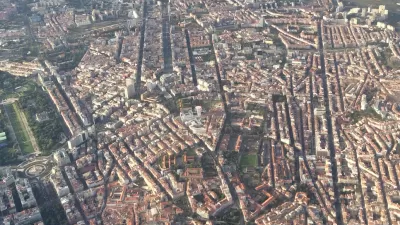Looking for a long read this long weekend? Check out Bruce Katz and Jennifer Bradley's article on the keys to creating collaborative metropolitan areas that can successfully compete in the global economy.
In the newest entry in Next American City's "Forefront" series, Katz and Bradley look at the shifting status of cities entering the "next economy" emerging from the ashes of the global economic recession. The authors argue that the "collapse of the consumption-driven, domestic-focused growth model" that the recession precipitated, has redefined the ways in which communities across America must compete to succeed in the global economy. At the root of this competition is the need for collaboration with partners across cities, regions, and even the world.
Katz and Bradley argue that, "the realities of economic restructuring, global competition, fiscal
pressures, environmental imperatives, technological possibilities and a
dysfunctional federal government require new models of collaboration
within and among metropolitan regions." And "the metro scale, and even the multi-metro and regional scale in certain places," they note, "is now the entry ticket to global competition."
With this framework for success in mind, the authors look to the key characteristics of metros that have positioned themselves well to compete in the next economy and give examples of metros that exhibit each of the traits identified below.
"Those
metros that have created successful networks have certain
characteristics in common. They are smart about their goals and how to
measure them; confident enough to resist cookie-cutter strategies;
sophisticated about their place in the global economy; clever about
balancing short-term wins and long-term aspirations; and open to people
representing a spectrum of groups, interests and sectors."
They conclude their article with an examination of the key tools in building metropolitan networks: "the new technologies and platforms that connect people instantly and expansively."
FULL STORY: Mastering the Metro

Planetizen Federal Action Tracker
A weekly monitor of how Trump’s orders and actions are impacting planners and planning in America.

Maui's Vacation Rental Debate Turns Ugly
Verbal attacks, misinformation campaigns and fistfights plague a high-stakes debate to convert thousands of vacation rentals into long-term housing.

Restaurant Patios Were a Pandemic Win — Why Were They so Hard to Keep?
Social distancing requirements and changes in travel patterns prompted cities to pilot new uses for street and sidewalk space. Then it got complicated.

In California Battle of Housing vs. Environment, Housing Just Won
A new state law significantly limits the power of CEQA, an environmental review law that served as a powerful tool for blocking new development.

Boulder Eliminates Parking Minimums Citywide
Officials estimate the cost of building a single underground parking space at up to $100,000.

Orange County, Florida Adopts Largest US “Sprawl Repair” Code
The ‘Orange Code’ seeks to rectify decades of sprawl-inducing, car-oriented development.
Urban Design for Planners 1: Software Tools
This six-course series explores essential urban design concepts using open source software and equips planners with the tools they need to participate fully in the urban design process.
Planning for Universal Design
Learn the tools for implementing Universal Design in planning regulations.
Heyer Gruel & Associates PA
JM Goldson LLC
Custer County Colorado
City of Camden Redevelopment Agency
City of Astoria
Transportation Research & Education Center (TREC) at Portland State University
Jefferson Parish Government
Camden Redevelopment Agency
City of Claremont





























